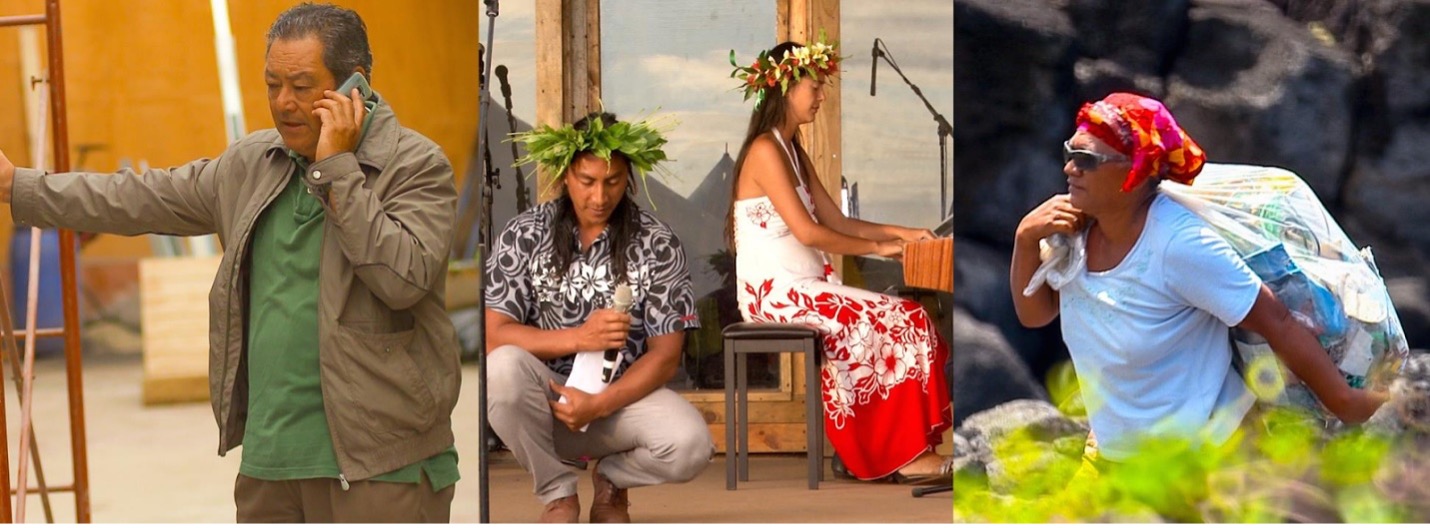Digital Collections
Celebrating the breadth and depth of Hawaiian knowledge. Amplifying Pacific voices of resiliency and hope. Recording the wisdom of past and present to help shape our future.
In “Eating Up Easter” (2018), native Rapanui filmmaker Sergio Mataʻu Rapu explores the modern dilemma of the Rapanui people who risk losing everything to the globalizing effects of tourism. The film follows four islanders, descendants of the ancient statue builders, who are working to tackle the consequences of their rapidly developing home.
CLICK HERE TO REGISTER to view this film, which will be available to stream online between April 22 and May 6 in celebration of Earth Day.
PLUS, stay tuned for a new episode of Pacific Conversations with our partners in Rapa Nui, including a talk with filmmaker Sergio Rapu. Our newest episode will premiere here on our Kaʻiwakīloumoku website on April 28, 2021!

"Eating Up Easter" is a co-production of Mara Films, Kartemquin Films, and Pacific Islanders in Communications (PIC), with funding provided by the Corporation for Public Broadcasting (CPB), Independent Television Service (ITVS), Princess Grace Foundation, and Ford Foundation Just Films.
Director: Sergio M. Rapu
Executive Producers: Leanne Ferrer, Gordon Quinn, Betsy Steinberg
Producers: Elena Rapu, Sergio M. Rapu
Editor: Liz Kaar
Writer: Elena Rapu
Director of Photography: Jeff Saunder
Camera Operator: Mark Mostad
SYNOPSIS
In a cinematic letter to his son, native Rapanui (Easter Island) filmmaker Sergio Mata’u Rapu explores the modern dilemma of their people who risk losing everything to the globalizing effects of tourism. The film follows four islanders, descendants of the ancient statue builders, who are working to tackle the consequences of their rapidly developing home. Mama Piru leads recycling efforts to reduce trash, Mahani and Enrique use music to reunite their divided community, and Sergio tries to understand the motivations of his father who embraces the advantages of building new businesses. These stories intertwine to reveal the complexities of development and the contradictions within us all as we are faced with hard choices about our planet’s future.
DIRECTOR’S STATEMENT
For the last 50 years, my island – my culture – has been used as a cautionary tale of human’s ability to destroy our planet. Film cameras have pointed away from our thriving community and instead focused on our moai, stone statues representing our ancestors and a mysterious past. Journalists’ pens wrote about the destruction of our island, the death of our people, the demise of a great civilization. But they got it wrong. We, the Rapanui, are still here. We were not able to tell our story then, but today we are.
The catalyst to start this project was when I came across an news article in 2011 explaining that Hawaii only had enough food reserves for 1 week. If the airport was destroyed, if a storm seized all naval traffic, food would become a huge issue to the more than 1 million residents and visitors. I turned the same question to my island, Rapa Nui (Easter Island). How long did we have before my people went hungry? I knew our demand for external products was high, but I didn’t know how much. As I learned more about how little we grew (because building cabins for tourists was more lucrative) and how much we imported (which contributed heavily to the buildup of trash on the island), I realized that the story was not in food security but in the rapid development of a tiny island in the middle of the Pacific.
The misrepresentation of my culture has been the fuel behind my interest in telling stories. But as I dug deeper into the problems and complexities of living on a remote island, I found universal qualities reflected in the wealthiest continents on the planet. The truth is that we are all the same, living on our own little island in the vast universe. But our story is not a cautionary tale, because we are still alive, we hold the power to correct our course in history as my ancestors did.
Days before picture locking the film, of what would be the end of a 6-year process, I heard news from the island. Mama Piru, one of our central characters, had passed away at the young age of 60. Our hearts broke and our minds went blank. What will we do without her driving energy to care for our planet? Who will pick up where she left off? Days of numbness finally brought the answer – we will, we must. This film is dedicated to her and to our ancestors who navigated through the rough seas and brought our people closer to the light beyond the horizon.
Hai Mahatu. Amu’a.
Sergio Mata’u Rapu